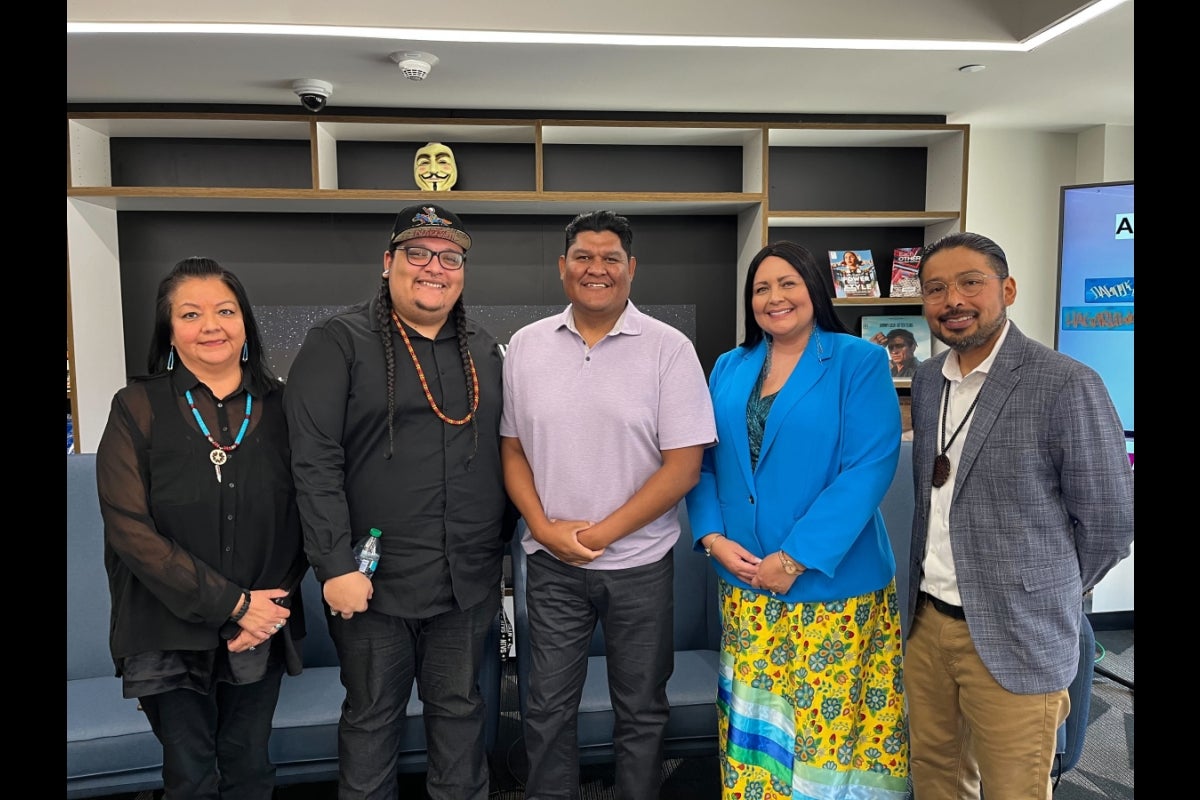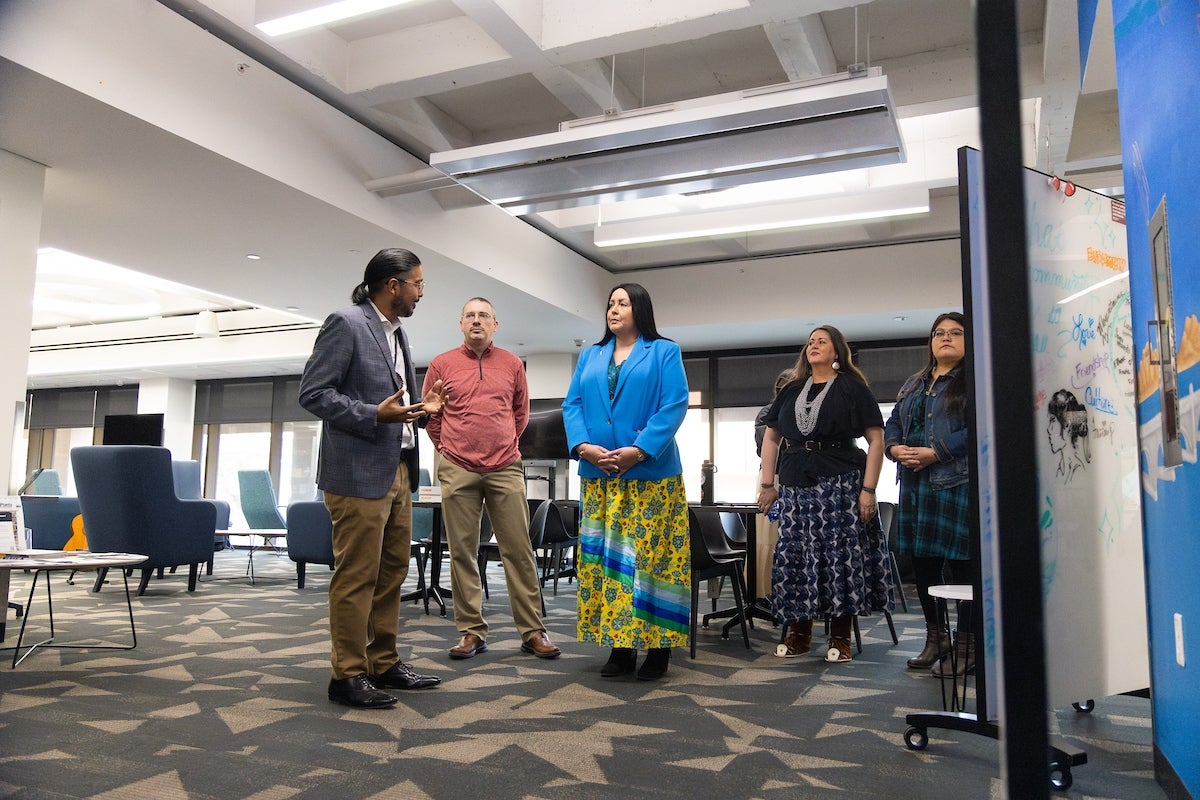Empowering Tribes through libraries
American Library Association President Cindy Hohl and panel discuss protecting Indigenous Knowledge

Cindy Hohl shares remarks at the Labriola National American Indian Data Center.
Photo by Emma Fitzgerald/Arizona State University
Advocates. Protectors. Community. Representation. Sovereignty. Respect. Time immemorial. These were just a few words used to describe Indigenous libraries by a group of established and emerging Indigenous scholars.
On Wednesday, Jan. 22, the Labriola National American Indian Data Center at the ASU Library convened a panel to explore the importance of Tribal libraries and Indigenous librarians. The conversation was hosted in the Labriola Center at Hayden Library on the Tempe campus and featured special guest Cindy Hohl, president of the American Library Association.
Hohl is a member of the Santee Sioux Nation and is the second Native American to hold the position. She is also the past president of the American Indian Library Association and past recipient of ALA’s inaugural Spectrum Changemaker Award.
Hohl’s visit coincided with the ALA LibLearnX Conference in Phoenix, Arizona. As the one and only Indigenous-led library center within a doctoral research university in the continental United States, she recognized the Labriola Center’s leadership in the library community.
“I believe that the Labriola National American Indian Data Center is a phenomenal model for other communities to consider showing how you expand centering Indigenous knowledge, traditional practice and scholarly work in a one-stop shop for your students and scholars,” said Hohl. “When you look at programs that are so intentional in their reach and scope, it’s a wonderful time for librarians to see that growth continues as innovation is supported and universities such as Arizona State University, are really putting support behind these efforts.”
In addition to Hohl, the panel comprised Melanie Toledo-Matteson (Diné), a Tribal librarian at Ira H. Hayes Memorial Library in the Gila River Indian Community; Nataani Hanley-Moraga (Navajo/Húŋkpapȟa Lakota) an ASU graduate currently pursuing his master’s in library and information science at the University of Arizona and a Knowledge River scholar; and Kevin Brown, a doctoral candidate in the Learning, Literacies, and Technologies program in the Mary Lou Fulton College for Teaching and Learning Innovation and member of the Navajo Nation.
The panelists shared their experiences in Tribal libraries, how they communicate the impact with friends, families and networks, and where the future of Indigenous libraries is headed.
Melanie Toledo-Matteson worked for many years as a librarian with the Ak-Chin Indian Community and now with the Gila River Indian Community, she shared the importance of making her voice heard in the library community.
“Melanie is a revered leader in Indian County especially in Tribal libraries,” said Hohl. “She is someone who is very humble in spirit, and she is so inspiring for the work she does for communities. Whenever she presents at a national conference, you always hear about the passion and the heart behind the work that she does.”
During his time as an ASU student, Nataani Hanley-Moraga was introduced to the Labriola Center from a hip-hop show and eventually became a student worker. He talked about his journey and learning how a career path as a librarian or archivist is part of protecting Indigenous knowledge.
“Hearing Nataani start his journey through library school and his time being immersed in this environment, that really is going to help him level up in his career,” said Hohl. “This is a launchpad for what traditional Tribal librarianship can look like at a research institution level.”
As an educator, Kevin Brown shared how libraries are the embodiment of sovereignty, as well as the importance of creating spaces for Indigenous students to be themselves so they can succeed in higher education.
“I’ve admired [Kevin] for years. He was a library director and now he’s earning his Ph.D.,” said Hohl. “It’s so wonderful to share these spaces together and to inspire one another to hear about their work and to continue to grow what it means to serve as a Tribal librarian at this state and time.”
After the program, attendees continued their discussions over lunch, sharing their thoughts and experiences. The event emphasized the Labriola Center’s role in creating and maintaining spaces for these conversations and being vocal about protecting Indigenous knowledge.
“Expanding scholarship is something that benefits all of us. And so when you look at the work of the center and you see the staff and what they’re putting together here, it really is remarkable,” said Hohl. “I loved the campus, the weather here is beautiful. These mountains are everything. Most sacred lands are here and you can feel it. The energy has been so positive and it’s been a wonderful visit. I’m truly grateful.”



